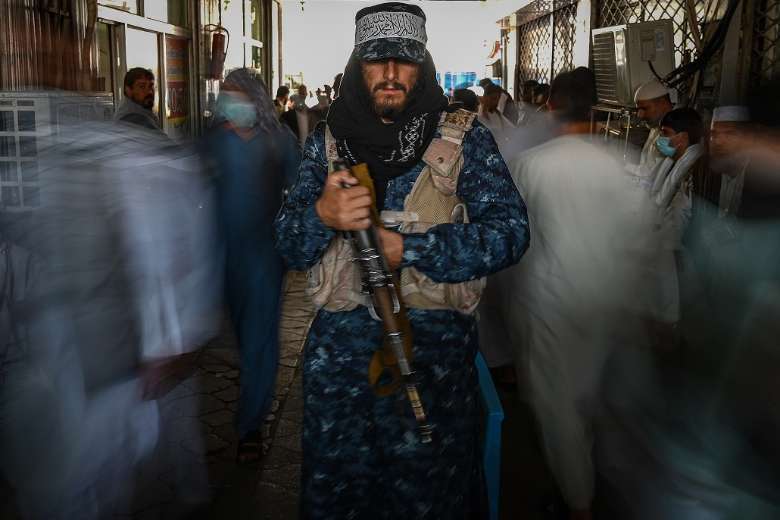The Afghan civil war is not over and to relent on recognition would constitute a savage betrayal of lost lives

A Taliban fighter stands guard at a market with currency exchange shops in Kabul on Sept. 5. (Photo: AFP)
Just three weeks after the Taliban seized Kabul, the militia has shown no signs of shaking off the ultra-orthodox practices of its previous incarnation that ensured Afghanistan remained a failed state throughout the latter half of the 1990s.
Back then public executions, the amputations of thieves’ hands and the flogging of women were mandated by ad-hoc Sharia courts and inflicted by gun-toting religious police, often for trivial offenses.
All forms of human images — on television, photographs and paintings — were banned alongside access to education for girls. These were just a few of the many lame edicts issued by the mullahs who led the Taliban from Kandahar in the deep Pashtu-dominated south.
Throughout their five-year occupation of Kabul, which ended with the 2001 US-led invasion, the Taliban proved themselves an alien concept for the three-quarters of the country which fell outside their tribal domains, lands divided by the ethnic Tajiks, Turks, Hazara and Uzbeks. There the Taliban were widely loathed as outsiders.
Internationally, they mustered the support of just three countries: the United Arab Emirates, Saudi Arabia and Pakistan. Still, then leader Mullah Mohammed Omar sought wider acceptance and craved United Nations recognition.
At each annual meeting of the UN credentials committee, Taliban chiefs argued that control of Kabul was enough to stake their claim over the entire country.
The Taliban have also housed ISIS-K, which bombed Kabul airport on Aug. 26, in much the same way as previous militia leaders provided a safe haven for al-Qaeda
But the UN stuck with then president Burhanuddin Rabbani, who was backed by Ahmad Shah Massoud, the head of the Northern Alliance who was based in the impenetrable Panjshir Valley in the northeast. He was assassinated shortly before the 9/11 terror attacks on the United States in 2001.
The Taliban have returned with a vengeance following the recent US withdrawal and have put international recognition back onto the diplomatic agenda with implications for every seat in the UN General Assembly and the big powers with little interest in common sense or decency.
They must decide whether to accept the militia and its harsh interpretations of the Quran as the Islamic Emirate of Afghanistan over the ousted, elected government of Ashraf Ghani.
And it should not be a difficult decision. The Taliban have already shattered the agreement struck with former US president Donald Trump that enabled the shambolic withdrawal of US military forces under Joe Biden.
